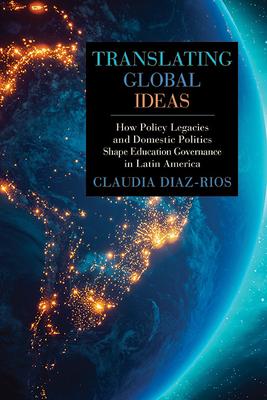International organizations have consistently influenced education reforms in Latin America, but not all countries have adopted the same policy recommendations. This book offers a unique comparative analysis of secondary education reforms in Chile, Argentina, and Colombia, from the 1960s to the 2010s, with a focus on three key areas: manpower planning, state-retrenchment (market-based versus active-state), and ideas about having a right to a quality education in an era of government accountability. While responding to similar policy recommendations, these countries have differed in how they have implemented decentralization, incorporated private actors, allocated authority over curriculum, and established instruments of accountability. Claudia Diaz-Rios traces the legacies of previous education policies and local struggles among stakeholders in reshaping--and sometimes rejecting--foreign recommendations. Translating Global Idea will be an invaluable resource for scholars of comparative politics and the globalization of education--particularly those interested in policy development in middle- and low-income countries, as well as practitioners invested in promoting education policy changes in Latin America.
| FindBook |
有 1 項符合
Translating Global Ideas: How Policy Legacies and Domestic Politics Shape Education Governance in Latin America的圖書 |
 |
Translating Global Ideas: How Policy Legacies and Domestic Politics Shape Education Governance in Latin America 作者:Diaz-Rios 出版社:State University of New York Press 出版日期:2024-04-01 語言:英文 規格:精裝 / 256頁 / 22.86 x 15.24 x 2.54 cm / 普通級/ 初版 |
| 圖書館借閱 |
| 國家圖書館 | 全國圖書書目資訊網 | 國立公共資訊圖書館 | 電子書服務平台 | MetaCat 跨館整合查詢 |
| 臺北市立圖書館 | 新北市立圖書館 | 基隆市公共圖書館 | 桃園市立圖書館 | 新竹縣公共圖書館 |
| 苗栗縣立圖書館 | 臺中市立圖書館 | 彰化縣公共圖書館 | 南投縣文化局 | 雲林縣公共圖書館 |
| 嘉義縣圖書館 | 臺南市立圖書館 | 高雄市立圖書館 | 屏東縣公共圖書館 | 宜蘭縣公共圖書館 |
| 花蓮縣文化局 | 臺東縣文化處 |
|
|
圖書介紹 - 資料來源:博客來 評分:
圖書名稱:Translating Global Ideas: How Policy Legacies and Domestic Politics Shape Education Governance in Latin America
Teaching and Assessing Writing in the Primary School: A Whole School Approach
Teaching and Assessing Writing in the Primary School: A Whole School Approach
Research-Based International Student Involvement: The Research-Tandem Model
Integrating Computational Thinking Through Design-Based Learning: Strategies for Integration in Different Disciplines
Critical Histories in Care and Education: Understanding the Connections Between the English Care and Education Systems from the Nineteenth Century to
Critical Histories in Care and Education: Understanding the Connections Between the English Care and Education Systems from the Nineteenth Century to
Developing Employability Capital in University Students: A Practical Guide
Discovery Science: 27th International Conference, DS 2024, Pisa, Italy, October 14-16, 2024, Proceedings, Part I
The University and the Algorithmic Gaze
Pragmatism and Historical Representation
Teaching and Assessing Writing in the Primary School: A Whole School Approach
Research-Based International Student Involvement: The Research-Tandem Model
Integrating Computational Thinking Through Design-Based Learning: Strategies for Integration in Different Disciplines
Critical Histories in Care and Education: Understanding the Connections Between the English Care and Education Systems from the Nineteenth Century to
Critical Histories in Care and Education: Understanding the Connections Between the English Care and Education Systems from the Nineteenth Century to
Developing Employability Capital in University Students: A Practical Guide
Discovery Science: 27th International Conference, DS 2024, Pisa, Italy, October 14-16, 2024, Proceedings, Part I
The University and the Algorithmic Gaze
Pragmatism and Historical Representation
|











